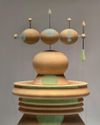
As the Mughal imperial entourages made the long journey from the dusty plains of Agra and Lahore to enjoy the beauty of Kashmir, the emperors and their noblemen encamped at natural springs, lakes and places of breathtaking beauty and commissioned the building of pleasure gardens in the finest settings. These gardens were laid out in the reigns of the Mughal emperors, between 1619 and 1650 CE.
Though Akbar did visit the sites of Verinag and establish the Mughal garden traditions in Kashmir, it was primarily during the reigns of his son Jahangir and grandson Shah Jahan that the gardens were laid out and developed.
All six gardens were built by the Mughals— emperors, queens, princes and noblemen—as pleasure gardens and retreats to enjoy the natural beauty of the valley that they referred to as “Kashmir jannat nazir”—Kashmir that is like paradise.
The sacred spring of Verinag became the focus of a breathtaking garden and Shalimar Bagh was laid out near Dal in the reign of emperor Jahangir by his young prince, Khurram, who later was known as Shah Jahan.
Nishat Bagh facing the lake was laid out by Asaf Khan, brother of empress Nur Jahan, and the garden of Achabal was developed by empress Nur Jahan and later by Princess Jahanara. Chashma Shahi, a natural spring believed to have healing powers as recorded in the Akbarnama, was set within a charming terraced garden by Ali Mardan, Shah Jahan’s governor in Kashmir.
Pari Mahal was commissioned by Prince Dara Shikoh for his spiritual guide. Collectively, these six gardens represent the supreme achieve ment of Persian-Timurid garden traditions and the garden legacy of the three greatest Mughal emperors: Akbar, Jahangir and Shah Jahan.
This story is from the {{IssueName}} edition of {{MagazineName}}.
Start your 7-day Magzter GOLD free trial to access thousands of curated premium stories, and 9,000+ magazines and newspapers.
Already a subscriber ? Sign In
This story is from the {{IssueName}} edition of {{MagazineName}}.
Start your 7-day Magzter GOLD free trial to access thousands of curated premium stories, and 9,000+ magazines and newspapers.
Already a subscriber? Sign In

AS NEW DELHI'S GALLERY ESPACE MARKS ITS 35TH ANNIVERSARY, AD LOOKS AT GALLERIST RENU MODI'S JOURNEY IN ART.
The New Delhi-based Gallery Espace, founded by Renu Modi in 1989, recently marked its 35th anniversary with two special exhibitions.

ROCHELLE PINTO, EDITOR OF VOGUE INDIA, WRITES ABOUT FORCES OF FASHION, WHICH PUT 39 UNIQUE WORKS UNDER ONE ROOF, PIECING TOGETHER A SHORT HISTORY OF FASHION IN INDIA.
If you want to step into the mind of Cristóbal Balenciaga, the game-changing Spanish couturier who died over 50 years ago, all you have to do is beg, bribe or charm your way into 10 Avenue George V in Paris.

AS INVISIBLE COLLECTION COMES TO INDIA, FOUNDERS ISABELLE DUBERNMALLEVAYS AND LILY FROEHLICHER SHARE THEIR SERENDIPITOUS JOURNEY TO THE COUNTRY.
Isabelle Dubern-Mallevays and Lily Froehlicher first found India at their doorstep when Sonam Kapoor Ahuja borrowed a few pieces from their collection for an AD India cover story in 2021.

ANONYMOUS ARTIST PRINCESS PEA SHOWCASES A COLLECTION OF NINE NEW PRINTS AT THE SOHO HOUSE LOUNGE AT ART MUMBAI.
In Princess Pea's new collection of works, poetry, craft and the divine femininity coalesce with grace.

ARTISTS RITU AND SURYA SINGH'S WONDERLAND OF A HOMESTUDIO IN THE PINK CITY URGES YOU TO LOOK AT THE BEAUTY AND NARRATIVE OF WASTE.
Husband-wife artist duo Ritu and Surya Singh, better known as Wolf, live at \"The Farm\", a unique 20-acre madhouse of wonders in the heart of Jaipur.

KENGO KUMA TALKS TO AD ABOUT HIS DESIGN ADDITIONS AS THE CENTRO DE ARTE MODERNA GULBENKIAN IN LISBON OPENS ITS DOORS AGAIN.
Everyone who has lived in Lisbon likely has a fond memory of the Gulbenkian complex.

FROM HIS REVERENCE FOR GANDHI TO HIS LOVE OF DANCE, A BOOK BY DAG OFFERS NEW WAYS TO KNOW MF HUSAIN.
If there was ever an Indian artist who earned immense fame and yet remained unknowable, it is MF Husain.

WHAT WOULD BAWA DO? WONDERS APARNA RAO, COFOUNDER OF PHANTOM HANDS, AS SHE PRODUCES REISSUES OF GEOFFREY BAWA'S HIGHLY CONTEXTUAL FURNITURE.
In mid-December last year, in the freshly restored Kannangara House designed by Geoffrey Bawa in 1959, an exhibition based on the late Sri Lankan master's furniture designs opened.

BANGLADESHI ARTIST AYESHA SULTANA'S RECENT DUBAI EXHIBITION EXPLORED THE DUAL NATURE OF STRENGTH AND FRAGILITY.
Born in Bangladesh in 1984, the US-based Ayesha Sultana explores notions of form, space and materiality.

WE CATCH UP WITH TARIK CURRIMBHOY AT HIS STUDIO IN NEW YORK, AFTER HIS FIRST SOLO SHOW IN INDIA.
Tarik Currimbhoy's sculptures have a pure, meditative quality. A viewer can stand mesmerized for hours watching the elegant, geometric shapes move back and forth.